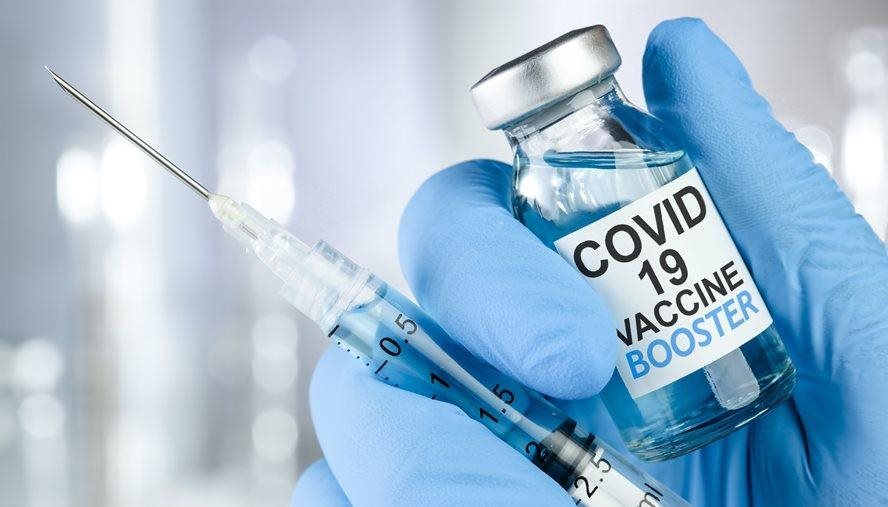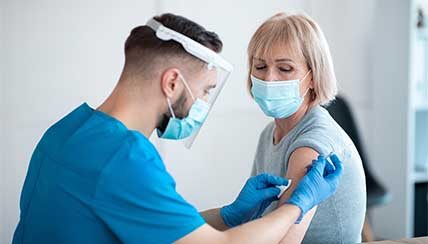COVID-19 (Coronavirus) & Cystic Fibrosis
 People with cystic fibrosis (CF) may be continuing to have anxiety about their health during the ongoing COVID-19 pandemic. However, there isn't any evidence to suggest that those with CF are more likely to contract Sars-CoV-2, the virus that causes COVID-19, according to Dr. Jennifer Taylor-Cousar, co-director of the Adult Cystic Fibrosis Program at National Jewish Health. “What we do know is that those with CF are more at risk to have severe COVID-19 because of their underlying lung disease.” The best prevention we have against severe disease from COVID-19 is vaccination, and we strongly encourage all those who are eligible to get vaccinated and boosted.
People with cystic fibrosis (CF) may be continuing to have anxiety about their health during the ongoing COVID-19 pandemic. However, there isn't any evidence to suggest that those with CF are more likely to contract Sars-CoV-2, the virus that causes COVID-19, according to Dr. Jennifer Taylor-Cousar, co-director of the Adult Cystic Fibrosis Program at National Jewish Health. “What we do know is that those with CF are more at risk to have severe COVID-19 because of their underlying lung disease.” The best prevention we have against severe disease from COVID-19 is vaccination, and we strongly encourage all those who are eligible to get vaccinated and boosted.
Cystic fibrosis patients are used to social distancing and taking extra precautions to keep from getting sick. In fact, these habits may be the reason that fewer than expected cystic fibrosis patients have reported contracting COVID-19. Dr. Taylor-Cousar says, “Overall, people with CF aren’t catching COVID-19 as frequently as people in the general population, most likely because they are used to washing their hands frequently, staying home and staying six feet away from other people.” The Cystic Fibrosis Foundation has recently summarized the data surrounding COVID-19 in people with CF in the United States.
Routine Care for Cystic Fibrosis during COVID-19
The COVID-19 pandemic has made getting treatment for cystic fibrosis at health care centers harder at some points. The Cystic Fibrosis Foundation recommends that patients see their doctors quarterly for an in depth checkup. During the pandemic, according to Dr. Taylor-Cousar, many health care providers are using telehealth to connect with CF patients. “Telehealth let’s doctors give patients advice about their medications, and anything that needs to change because of mild COVID symptoms without the patient having to leave their house,” she explained.
COVID-19 Treatment for CF Patients
If a cystic fibrosis patient does become sick with COVID-19, the patient’s treatment may look the same as a patient without CF.
“If it’s only a mild cough and only a little fever, doctors will manage the symptoms the same way that they would manage people without CF. So, they could take Tylenol or Advil. If they started to have increased symptoms, we would have them increase their therapies,” Dr. Taylor-Cousar explained. There are also outpatient options for treatment. However, because new oral COVID-19 therapies may have drug-drug interactions with other medicines that people with CF take, it is important to talk to the CF team before starting any COVID-19 therapy. As COVID-19 symptoms get worse for a cystic fibrosis patient, they may need to go to the hospital for more intense treatment. Dr. Taylor-Cousar recommends that CF patients make a plan with their provider to respond to COVID-19 symptoms just in case.
Healthy Precautions to Take
Even though the CDC masking guidelines have eliminated the need for fully vaccinated people to wear a mask in most places, people with cystic fibrosis need to continue to take some precautions to stay healthy and prevent catching COVID-19 or other diseases.
- Wear a facemask when you’re near others who are unvaccinated.
- Maintain social distancing of at least six feet.
- Wash your hands for at least 20 seconds with soap and water regularly.
- Avoid crowds and contact with anyone who may be sick.
- Avoid touching your eyes, nose and mouth.
Post-Transplant
If you are post-transplant, you have a lower immune response to vaccines and higher risk for severe disease from COVID-19. Talk with your CF care team or your transplant team about any additional precautions you need to take.
Cystic fibrosis may make the effects of COVID-19 more severe for some people, so it’s important to continue to lower your risk of contracting the disease. If you have questions about your individual situation, please talk to your CF care team.
This information has been reviewed and approved by Jennifer L. Taylor-Cousar, MD and Sara Dederman-Brayshaw, RN, MSN (May 2021).
The information on our website is medically reviewed and accurate at the time of publication. Due to the changing nature of the COVID-19 pandemic, information may have since changed. CDC.gov and your state’s health department may offer additional guidance. |


